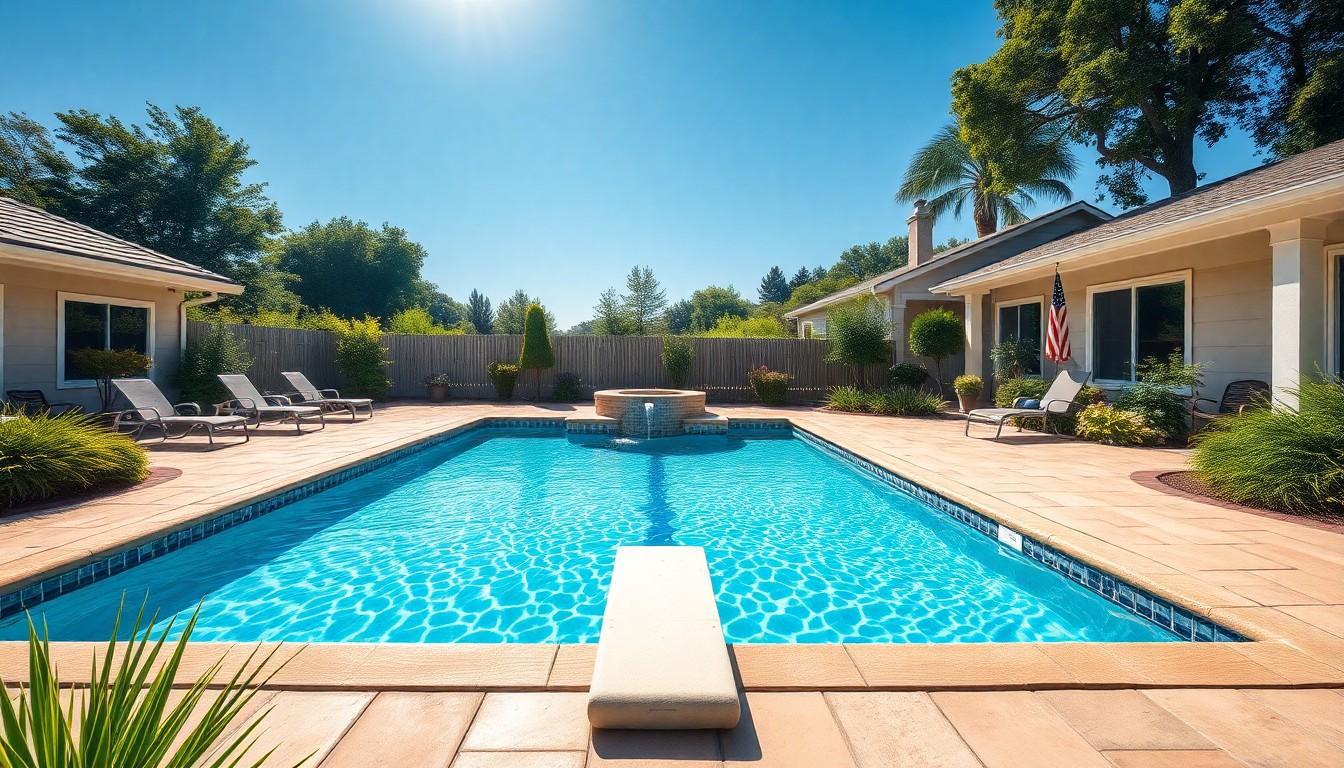When summer rolls around and the sun’s shining, nothing beats the joy of a backyard swimming pool. But before diving into those refreshing waters, it’s crucial to consider the unexpected splashes that come with pool ownership—like accidents or property damage. Enter swimming pool insurance, your safety net in a world where cannonballs can lead to costly consequences.
Table of Contents
ToggleOverview of Swimming Pool Insurance
Swimming pool insurance offers coverage for various risks associated with residential pools. Homeowners benefit from protection against injuries and property damages that might occur in their pool area. This insurance typically forms part of a homeowner’s policy but may require additional endorsements or standalone coverage.
Coverage options vary significantly. Liability coverage protects against legal claims resulting from accidents, ensuring financial support for legal fees and settlements. Property damage coverage helps replace or repair pool structures, equipment, and surrounding landscaping damaged by incidents.
Understanding state regulations impacts the need for swimming pool insurance. Some regions mandate liability coverage levels, while others emphasize safety requirements for pool barriers or fencing. Insurers might also assess the pool’s type, size, and location, influencing coverage terms and costs.
Claiming benefits hinges on specific policy conditions. Homeowners must document incidents, including photographs and written accounts, to support claims effectively. Insurers often investigate claims to assess responsibility and damage extent. Retaining a pool maintenance log can assist in demonstrating proper care, enhancing claim legitimacy.
Costs associated with swimming pool insurance vary by location and coverage limits. Homeowners can expect premiums to fluctuate depending on claim history and overall risk assessment. Engaging with an insurance agent helps clarify coverage options, ensuring adequate protection for unique pool-related scenarios.
Securing swimming pool insurance necessitates evaluating existing homeowner policies. Pool owners should inquire about additional coverage needs and incorporate safety measures to mitigate risks. These factors help prevent accidents and safeguard personal and financial assets.
Importance of Swimming Pool Insurance

Swimming pool insurance plays a critical role in protecting homeowners from various potential liabilities. It serves as a safeguard for both personal and financial assets in the face of unexpected incidents.
Liability Coverage
Liability coverage protects homeowners from legal claims resulting from accidents that occur in the pool area. This coverage typically addresses medical expenses and legal fees associated with injuries sustained by guests. Statistics show that over 3,000 drownings occur each year in the U.S., highlighting the necessity of robust liability insurance. Homeowners ensuring sufficient liability limits can reduce out-of-pocket expenses during claims. Additionally, some states enforce minimum coverage requirements, making it crucial to understand local regulations.
Property Protection
Property protection covers damages to the pool itself, surrounding landscaping, and any related structures. This type of coverage can encompass repairs for pool leaks, structural damages, or weather-related incidents. Homeowners benefit significantly from including this protection, as repair costs can soar into thousands. Maintaining an accurate record of the pool’s condition and any upgrades can streamline the claims process. Moreover, knowledge of the coverage limits helps homeowners prepare for unexpected repair expenses effectively.
Types of Swimming Pool Insurance Policies
Various types of swimming pool insurance cater to the distinct needs of homeowners. Understanding these options helps in selecting the best coverage.
Homeowners Insurance
Homeowners insurance often includes swimming pool coverage as part of its basic policy. This coverage typically encompasses liability protection for accidents occurring in the pool area. Homeowners benefit from this protection against medical expenses or legal fees from claims resulting from injuries. Property damage coverage applies to repairs needed for the pool and surrounding landscape. However, additional endorsements might enhance coverage limits. Insurance agents can provide essential guidance on how to align homeowners insurance with pool-specific needs.
Specialty Pool Insurance
Specialty pool insurance offers tailored protection for specific needs that standard homeowners insurance may not cover. This type of policy addresses unique risks associated with larger or more complex pool installations. Coverage can include specific liability for pool-related incidents and loss or damage caused by external factors. Homeowners prioritize this option when they have higher-value pools or unique features like hot tubs or extensive landscaping. Engaging with an insurance professional ensures that homeowners find the right policy to cover these specific risks comprehensively.
Factors Affecting Swimming Pool Insurance Rates
Swimming pool insurance rates are influenced by several key factors. Understanding these elements can help homeowners make informed decisions regarding their coverage.
Location
Location significantly impacts swimming pool insurance rates. Areas with higher crime rates or weather-related risks often see increased premiums. For example, regions prone to natural disasters such as floods or hurricanes present additional challenges for insurers, resulting in higher costs. Local regulations also play a role; certain states mandate specific safety features, affecting insurance requirements and rates. Homeowners in densely populated areas may encounter higher liability risks, which also influences insurance pricing. Ensuring compliance with local laws typically mitigates some costs.
Pool Type and Usage
Pool type and usage directly affect insurance premiums. Inground pools generally require higher coverage than above-ground ones due to increased risks. Additionally, features such as diving boards or slides can raise liability concerns, leading to elevated rates. Pools frequently used for entertaining guests bring potential liability risks, prompting insurers to adjust premiums accordingly. Furthermore, unique or luxurious pool designs may necessitate specialized coverage, which could influence costs. Regular maintenance and safety measures often lower risks and subsequently, insurance premiums.
Common Exclusions in Swimming Pool Insurance
Swimming pool insurance often comes with specific exclusions that homeowners should know. Commonly excluded items include damage due to a lack of proper maintenance. Insurance providers may not cover incidents resulting from negligence or failure to follow safety regulations.
Natural disasters, such as floods or earthquakes, typically fall outside standard coverage. These events can cause significant damage, but a separate policy may be necessary for protection against them. Homeowners need to consult their insurance agent to understand these limits.
Liability claims for injuries sustained due to reckless behavior often face exclusion. If a guest engages in unsafe activities, claims connected to those injuries may not be covered. Awareness of this can help homeowners enforce safety rules among their pool users.
Damage caused by extreme weather events also usually isn’t covered by standard policies. Hurricanes can wreak havoc on pools; thus, homeowners may want to explore additional coverage options specifically for these events. Seasonal storms may lead to similar coverage gaps.
Having no proper pool barrier or safety measures can limit coverage as well. Insurers often require safety features like fences or nets to be in place. Failure to comply can result in denied claims for accidents that occur.
Vandalism and theft may also see limitations depending on the policy. Standard homeowners insurance often provides some coverage for theft, yet specific exclusions could apply when it comes to pool equipment or furnishings. Verification with the insurance provider helps clarify the extent of protection.
Understanding these common exclusions helps homeowners navigate their insurance policies more effectively. Engaging with an insurance professional enables better alignment with specific needs and circumstances.
Conclusion
Swimming pool insurance is an essential component for homeowners looking to enjoy their backyard oasis while protecting themselves from potential liabilities. With the risks associated with pool ownership being significant, having adequate coverage can provide peace of mind.
By understanding the various types of policies available and the factors that influence insurance rates, homeowners can make informed decisions tailored to their needs. Engaging with an insurance professional ensures they navigate the complexities of coverage options effectively.
Investing in swimming pool insurance not only safeguards personal assets but also promotes a safer environment for family and friends. With the right protection in place, homeowners can fully enjoy their pools without the worry of unforeseen incidents.

